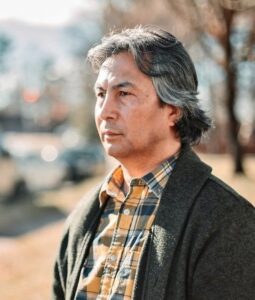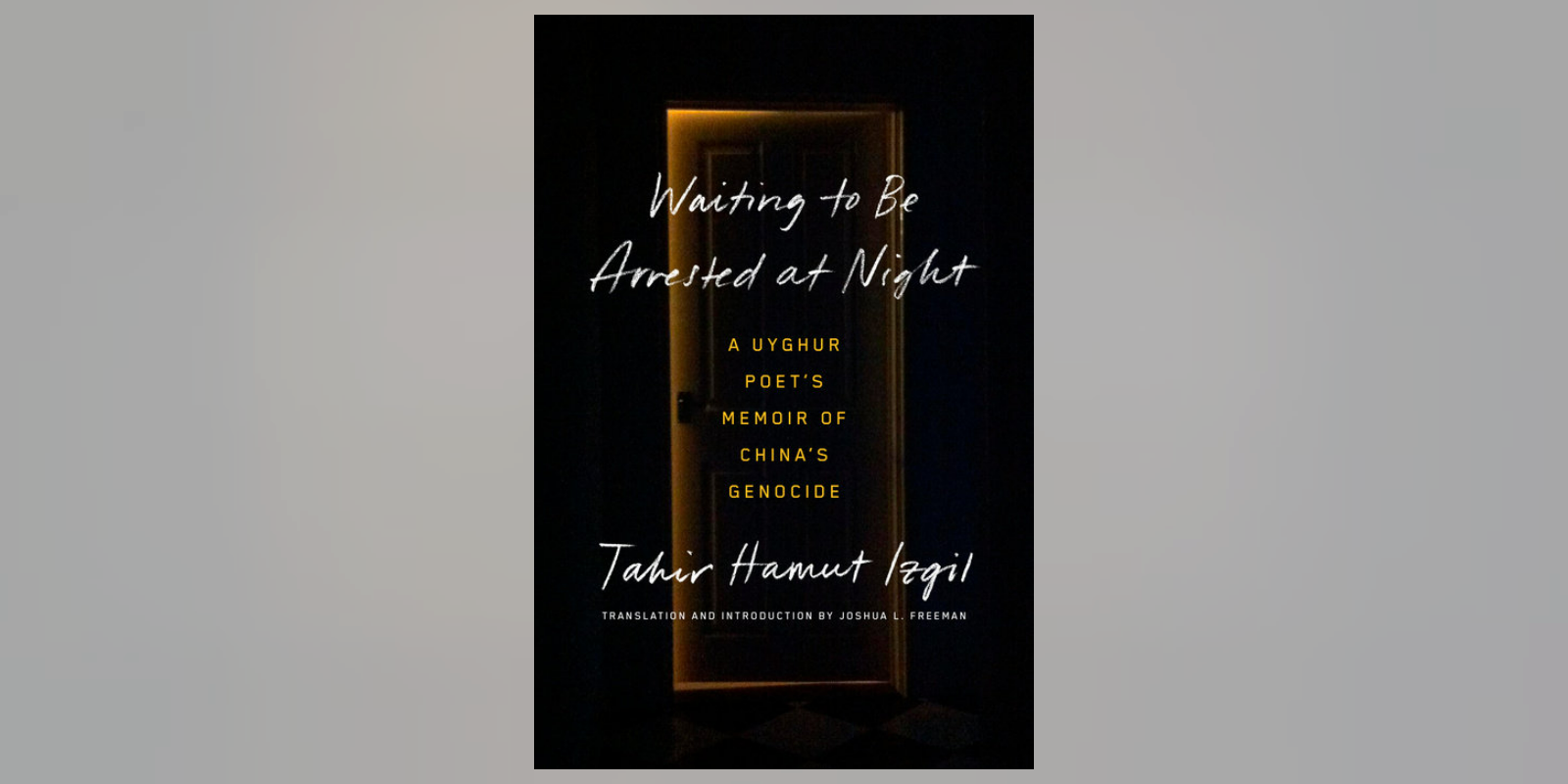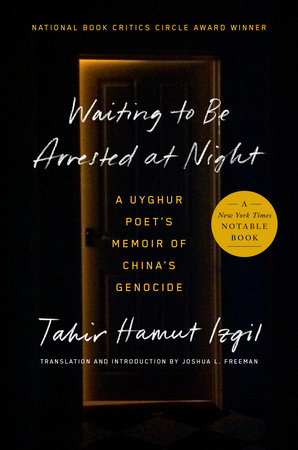Waiting to Be Arrested at Night is a poet’s account of one of the world’s most urgent humanitarian crises, and a harrowing tale of a family’s escape from genocide.
One
A Phone Call from Beijing
I keep returning to the first day of 2013.
That evening, I received an unexpected call from Ilham Tohti, an economics professor at Beijing’s Central University for Nationalities. It had been years since we’d talked. He was at a Uyghur restaurant behind the university, celebrating the new year over dinner with a mutual friend of ours from Beijing.
After exchanging pleasantries, Ilham declared: “Xi Jinping has taken power. Things will get better for us now. Don’t lose heart, and let our friends in Urumchi know that they should feel optimistic.” Ilham was in an excellent mood. When he said things would get better, he was referring to Uyghurs’ rapidly deteriorating political circumstances.
While today it’s clear how absurd it was to expect any good to come to Uyghurs from Xi Jinping, at the time numerous Uyghur intellectuals cherished such hopes. Some liberal Han intellectuals likewise suggested that Xi might turn out to be relatively liberal. Given the lack of transparency in Chinese politics, the political inclinations of new leaders were often subject to speculation.
Xi’s father, Xi Zhongxun, had been the ranking Communist Party official in northwest China soon after the party took power, and had criticized repressive state policies in the Uyghur region. Uyghur intellectuals preferred to think that Xi Jinping would follow in his father’s footsteps on the Uyghur issue. These were hopes born of desperation, a battered community’s daydream of better treatment by its colonial rulers.
I had met Ilham Tohti in the early 1990s at Central University for Nationalities (as it was then known), where I was finishing my bachelor’s degree and Ilham was studying for his master’s in economics. Ilham was an immensely energetic and loquacious man; he spoke quickly, as if his head was packed with words and he was rushing to get them all out. When we ran into each other on campus, he would begin talking excitedly on the spot as professors and students passed by. Once Ilham got started, he was hard to stop, especially on his favorite topic, the economy and demography of the Uyghur region.
Ilham would go on to become perhaps the most prominent dissident Uyghur intellectual in China. In the mid-2000s he founded a Chinese-language website called Uyghur Online, where he published articles defending Uyghurs’ legal rights. Ilham argued that the Chinese government’s own autonomy policies were not being implemented in the Uyghur region; that the Production and Construction Corps in Xinjiang functioned as a lawless state within a state; that the rapid influx of Han settlers was making the region’s indigenous communities into minorities in their own homeland; that Uyghurs faced crushing unemployment; that the Uyghur language had been marginalized in the educational system.
A central goal of Uyghur Online was encouraging healthy dialogue between Han and Uyghurs and strengthening interethnic understanding. The website became a hub for like-minded intellectuals and students-Uyghurs, Han, and others-and became increasingly influential abroad. My cousin had introduced me to Uyghur Online; he told me that numerous young Uyghurs had become active readers and that they often debated what they read on the site.
Needless to say, Ilham Tohti’s dissenting views drew the attention of the Chinese government. The police regularly invited him to “tea,” a euphemism for taking someone for an informal warning or questioning. During some sensitive periods, like the 2008 Beijing Olympics or visits by Western leaders to Beijing, police would take Ilham’s family for a monthlong “vacation.” In 2009, following the government’s declaration that Ilham bore responsibility for the July violence in Urumchi, he and his family disappeared. People assumed Ilham had been arrested. But after a month and a half of informal detention in the Beijing suburbs, he and his family were allowed to return home.
Despite all this, Ilham never believed that the government would formally arrest or imprison him. He was, after all, a professor at a university in the national capital, and considered his vocal criticism to be entirely within the law. The fact that his household was registered in Beijing also lent him some peace of mind. But the political climate in the capital was very different from that in the Uyghur region. If Ilham had engaged in the same activities in Xinjiang, he would already have been arrested.
Things did not turn out as Ilham thought they would. In mid-January 2014, news of Ilham’s arrest at his Beijing apartment reached us in Urumchi. When I heard the news, I inquired as to which police force had arrested him, and was told that the officers had arrived from Urumchi.
It was not normal for Urumchi police officers to travel more than two thousand kilometers to arrest a professor at a university in Beijing. Normally, if Ilham were to be arrested, the Beijing police would have jurisdiction. The involvement of the Urumchi police meant that Ilham’s arrest was a decision made at the highest levels. Not long after, we learned that a number of Ilham’s Uyghur students had disappeared from their school around the same time, likely into police custody. In other words, the situation was grave.
I was alarmed by the arrest of an intellectual who had merely called for the government to enforce its own laws. It gave me the sinking feeling that catastrophe lay ahead for Uyghur intellectuals as a group. As a measure against the approaching danger, I set aside time to review the files in my laptop as well as my desktop computer at work, and deleted every document, video, recording, and image that police could conceivably seize on as a pretext. I directed every employee in our office to conduct a similar “cleaning” of their own computer.
Not long before, while browsing the internet, I had come across “Charter 08,” a manifesto in which the Nobel Prize-winning Han dissident Liu Xiaobo and others called for democracy and civil liberties in China. After reading the manifesto, I decided to translate it into Uyghur; but, as I had no chance to publish the translation, it just sat on my computer. A couple of years earlier, a friend had given me a Word file with a Chinese translation of Xinjiang: China’s Muslim Borderland, a collection of scholarly articles by more than a dozen specialists from the United States and elsewhere. The People’s Liberation Army’s political department had translated the book into Chinese, presumably for internal circulation. Given the tight state control over information from abroad, I was eager to get my hands on any foreign materials I could relating to Uyghurs and our homeland, and I read the book cover to cover at least three times. I also had a PDF of Han writer Wang Lixiong’s book My Western Regions, Your East Turkestan, which had been published in Taiwan. And there was a photo that the Dalai Lama had taken with exiled Uyghur leader Rebiya Kadeer, his arm draped affectionately around her shoulder. I had been moved to see this warm connection between leaders of two communities facing oppression in China.
It had taken me a great deal of effort to find and translate these materials, and my unease grew as I reluctantly deleted them one by one. Later events, though, would prove this decision correct. Things were getting worse.
The repression following the 2009 violence in Urumchi had not yet concluded when the government began a separate campaign directed at Uyghurs. Known as “Strike Hard,” this campaign was supposed to target “religious extremism, ethnic separatism, and violent terrorism,” and its effects were far-reaching. Han migrants began arriving in Xinjiang in even greater numbers than before; Uyghurs’ homes were demolished and their land confiscated. Uyghur religious practice and cultural life were increasingly suppressed, and Uyghurs faced ever-increasing discrimination in daily life. The problems Ilham Tohti had identified did not merely go unaddressed; they festered. Yet the government insisted that any Uyghur discontent stemmed from separatism and terrorism, and punished people indiscriminately.
Two months after Ilham Tohti’s arrest, in March 2014, news came of a terrorist incident at a railway station in the southern Chinese city of Kunming, thousands of kilometers from Urumchi. State media announced that five black-masked Uyghurs had attacked people with knives in the ticket-sales hall.
Another two months passed. State media reported that two Uyghurs armed with knives had attacked passengers at the exit to the Urumchi train station before blowing themselves up. Not long after, it was reported that Uyghur terrorists had carried out a suicide attack on a morning market in Urumchi.
In the years immediately following the 2009 violence in Urumchi, the situation in the Uyghur region had seemed calmer. Now, with this spate of violent attacks in the space of three months, things once again grew tense. The government’s posture and rhetoric became more aggressive than ever.
Uyghurs typically referred to such incidents by saying “Something’s happened.” People I knew had complex feelings about these events. On the one hand, their resentment toward the government and the Han made them feel on some level that it served them right. On the other hand, they felt it was wrong to target civilians rather than the government. In addition, people worried that such incidents would result in even more state repression that could personally harm them. Those negatively affected would grumble, “Instead of doing these stupid things, why can’t these people just be grateful for their daily bread?”
State media reports on such events were generally vague, contradictory, and unpersuasive. Suspicions, guesses, and rumors spread rapidly. Government propaganda insisted that all such violent events were carried out by separatists and terrorists who aimed to split Xinjiang from China and establish an independent East Turkestan. The government refused to acknowledge any potential causes for the violence in its own policies and in Uyghurs’ own lives.
Among Uyghurs, though, all manner of accounts circulated about the origins of these attacks. For the most part, these accounts portrayed the authors of the attacks as having been victims of state injustice, bent on revenge. There were even those who believed that the government itself planned and carried out the violent incidents to provide a pretext for further repression, and to break Uyghurs’ will to resist.
In addition to punishing the individuals involved in each violent incident, it was the government’s practice to harshly punish people who had nothing to do with the incident but who were in some way related to the perpetrators: their relatives and acquaintances, people who had once shared a meal with them, people who had once had them over as houseguests. Such people were accused of having “taken terrorists under their wing.”
Like many other Uyghur intellectuals, I was quite interested to know how these incidents were reported in foreign media and what sort of reaction they elicited abroad. Following the 2009 violence in Urumchi, the internet was shut down in the Uyghur region for nearly a year. Even after it reopened, numerous foreign websites-especially news websites-were blocked; accessing them was considered a serious crime. Despite this, we furtively used VPNs to circumvent the state’s notorious Great Firewall and peruse various international news websites. We had so little access to information about our own homeland and what was happening around us that we were willing to take that risk.
Now, as state surveillance and control grew still tighter following Ilham Tohti’s arrest and the string of violent incidents, there remained little choice but to delete our VPNs and forgo international websites entirely. Without the opportunity to use the global internet, it seemed that listening to foreign news with a shortwave radio might be my only option.
That summer vacation, our family went to Kashgar. We visited my parents and spent time with old friends. The husband of one of Marhaba’s college classmates sold electric appliances at a shopping mall in Kashgar. I decided to buy a shortwave radio from him; I figured he could recommend a good one.
When I walked into his store, he was busily packing the radios displayed on his shelves into their boxes and stacking the boxes in large cartons. After we greeted each other, I asked what he was doing. “The police station called,” he said bitterly. “We’re to gather up all the radios in the store. From now on we’re not allowed to sell radios.”
It seemed the list of banned items had grown still longer. A few years earlier, the government had banned matches. Rumor had it that the state was trying to prevent separatists from fashioning explosives out of the sulfur in match heads.
That was the end of my plan to purchase a radio. A few days later, I heard that police had begun confiscating radios from people’s homes, first in the villages, then in the cities.
It seems the radio era is coming to an end, I said to myself.
I was born at the very end of the 1960s in a poor, unattractive little settlement on the northwestern edge of the Taklamakan Desert. This settlement was a production brigade in the Peyzawat Land Reclamation Sector, which belonged to the third division of the Xinjiang Production and Construction Corps. The production brigades in the sector were situated several kilometers from one another; traveling between brigades meant a trip down dirt roads through the desert. Residents lived in simple, identical mud-brick homes provided by the government. When there was tilling and harvesting to be done, members of the brigade worked collectively in the wide fields surrounding the settlement. These fields were newly reclaimed land. Carrying their mattocks on their shoulders, brigade members would walk together to the fields. Salaries were equal. Food-primarily corn flour-was provided according to quota. Meat, oil, rice, vegetables, fruit, and wheat flour were precious commodities. Sometimes we would go months without seeing sugar.
Where we lived, the most prized possessions were bicycles, wristwatches, and radios. A radio was the most important means of understanding the outside world and the leading source of entertainment. Each radio had chrome casing and a belt to hang around your neck. Men would strap on their wristwatches, seat their wives on the backs of their bicycles, and turn up the volume on the radios hanging around their necks as they rode to and from the bazaar. These were their happiest moments. My mother and father would ride like that to the bazaar, and in the evening would bring me back a round girde roll made from real wheat flour-not that coarse corn flour we always ate-and four or five candies. I would be the happiest kid in the world.
My father’s beloved radio usually hung from a post in our house. No one was allowed to touch it. We listened to the state’s propaganda news items, the weather reports that were always wrong, and the songs praising the party. My mom would hum along to the songs as she did housework.
The neighborhood kids would take apart old broken radios. We looked with fascination at the parts, unable to imagine how sound could emerge from them. It was the magnet behind the speaker that interested us most. We liked to remove the magnet and use it to find nails we buried under the sand. The magnet’s iron-pulling magic amazed us.
Copyright © 2023 by Tahir Hamut Izgil. All rights reserved. No part of this excerpt may be reproduced or reprinted without permission in writing from the publisher.

© Mattéo Deneux
Tahir Hamut Izgil is one of the foremost poets writing in Uyghur. He grew up in Kashgar, attended college in Beijing, and worked as a film director in the Uyghur region. His writing has appeared in The Atlantic, The New York Review of Books, and elsewhere. He lives near Washington, DC.






